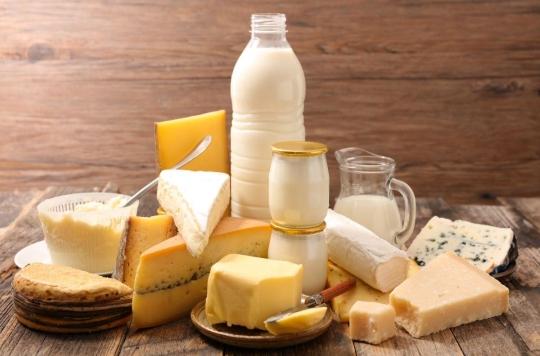For the body to function well, it needs calcium. To prevent it from drawing it from the bone at the risk of weakening it in the process, it is essential to have a diet sufficiently rich in the matter, explains Pr Véronique Breuil, rheumatologist, to Why Doctor.

- Calcium is essential for good bone health. Having a sufficient intake would therefore prevent the risk of osteoporosis.
- It is found in dairy products and in many mineral waters.
- Tablets can increase cardiovascular risk.
Osteoporosis is a diffuse disease of the skeleton which is characterized by a decrease in bone density, bone mass and therefore bone resistance, which in the long term can lead to more or less serious fractures. But the renewal of bone tissue taking place throughout life, the disease is not irremediable and can be prevented thanks to a healthy lifestyle and a sufficient calcium intake. ” The bone is a bit like a roof: there are beams and tiles. The tiles are calcium and vitamin D. Even if you have good beams reinforced by other treatments, if there are no tiles, the bone will not be resistant. It is essential for good bone health. »explains Professor Véronique Breuil, rheumatologist specializing in osteoporosis at the Nice hospital, at Pourquoi Docteur. “Every day, we lose about one gram of calcium in urine or stool. But since it takes a constant level of calcium in the blood for the heart, the brain, and the muscles to function, the body will take it from the bone and transfer it to the blood. Along the way, it demineralizes it. ». In this case, where to find the necessary calcium? Can the intakes take place by tablets?
Dairy products
You can find calcium in dairy products (cow, sheep or goat, whatever, you will even find it in low-fat products), but also in broccoli, sardines, langoustines, or even the seeds of chia and almonds. A one liter bottle of milk corresponds to one gram of calcium while a yogurt contains nearly 60 mg. Some mineral waters are also very rich in calcium, which can provide up to 500 mg per day. Thus, for a sufficient dose of calcium, it is recommended to eat at least two dairy products a day (if possible three) and to drink plenty of mineral water. In detail, cooked cheeses such as Comté or Parmesan are the richest in this matter: 30 grams provide 263 mg of calcium. But if you can’t stand dairy products, Véronique Breuil advises lots of mineral water, meat and vegetables. Vegans should not be afraid to abuse mineral water rich in calcium.
On the other hand, the specialist is not a big fan of tablets. “Philosophy and economically speaking, it’s better to get calcium from food. It will cost less and we can’t eat pills for thirty years, she exclaims. Furthermore, if you eat a little too much calcium, it will not have negative consequences; it just won’t be absorbed. On the other hand, studies have shown that if you have too much calcium through tablet supplementation, it can increase cardiovascular risk. »
How to calculate your calcium intake?
In 2015, several meta analyzes had evaluated the benefit of calcium supplements. In the case of 59 studies looking at people treated in this way, the researchers had found that the density of their bones only increased by 1 or 2% compared to a person who did not take a calcium supplement. In a editorial accompanying these results and published in the BMJProfessor Karl Michaëlsson of the University of Uppsala in Sweden, observed that if the benefits for good bone health were minimal, the risks of cardiovascular disease and constipation increased.
If you have fragile bones, Véronique Breuil advises you to go to the general public area of the site of the Grio (Group for Research and Information on Osteoporosis). Then click on “Do you know your calcium intake?” “. A questionnaire will allow you to calculate them according to your age, sex and diet. “The calcium intakes are noted opposite each food. This questionnaire can bring you many surprises »allowing you to take stock of the habits to readjust.
More calcium for pregnant women and over 65s
Because those who suffer from osteoporosis must absolutely “normalize their calcium intake to be able to contribute to strengthening bone strength, in addition to other treatments”, insists Véronique Breuil. In parallel, the doctor may prescribe vitamin D in patients who lack it. But, bone fragility or not, “everyone, from early childhood must have normal calorie intake”concludes the specialist.
According to ANSES, the calcium requirements are 500 mg in infants, 700 mg in children aged 4 to 6, 900 mg in children aged 7 to 9 and 1200 mg up to 19 years. In adults, they are 900 to 1,000 mg. In postmenopausal women, pregnant women, those who are breastfeeding and in seniors, the needs increase to go up to 1200 mg, even 1500 mg per day.

.















